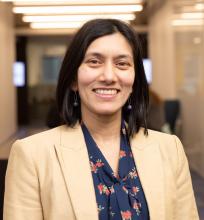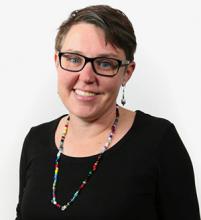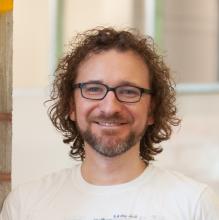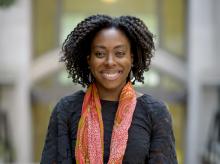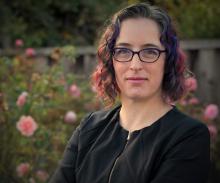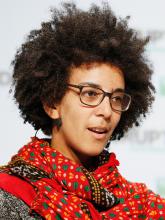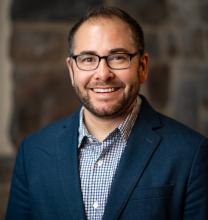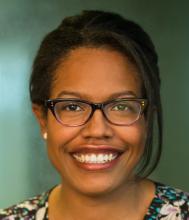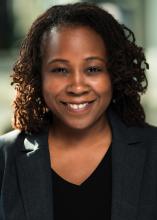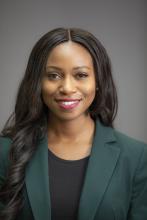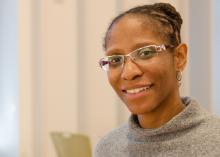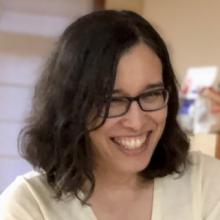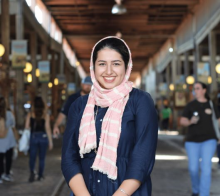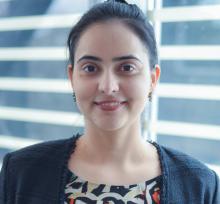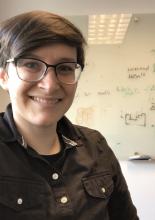Past Seminars
The HCII Seminar Series has been a weekly tradition at CMU since 1990. Details of our seminars from 2014 to present, as well as many of their recordings, are available below. A few years ago, we held a year of special programming in celebration of the seminar's 25th anniversary.
| Date | Title | Speaker | Talk title and Abstract |
|---|---|---|---|
| HCII Seminar Series - Marshini Chetty |
Marshini Chetty Assistant Professor, Computer Science Department, University of Chicago |
"Imagine All The People On A Trustworthy Internet" Imagine a world where the Internet caters to all types of users and hosts trustworthy content. Right now, this world seems far off for many reasons. For instance, this world would require us to think more broadly of user needs beyond an `… Full Details | |
| HCII Seminar Series - Susan Wyche |
Susan Wyche Associate Professor, Michigan State University, Department of Media and Information |
"Reconsidering Human-Centered Approaches to Design in Human-Computer Interaction and Development (HCI4D): Using Design Methods to Reimagine Technology in Rural Kenya" Enthusiasm for using human-centered design persists among HCI and HCI4D researchers and practitioners; funding agencies continue to… Full Details | |
| HCII Seminar Series - Michael Wessely |
Michael Wessely Postdoctoral Associate at MIT CSAIL |
"Fabricating Physical User Interfaces with Smart Materials" Physical user interfaces like mobile phones, or wearable health monitors fundamentally changed how we live and work. However, their fabrication is still exclusive to industry and manufacturing experts. I envision that in the future… Full Details | |
| HCII Seminar Series - Gabriela Marcu |
Gabriela Marcu Assistant Professor, University of Michigan School of Information |
"Designing for Coordination and Intervention in Behavioral Health" Behavioral and mental health is an underserved area, and receives less focus in health informatics research. Technology can play a role in different types of coordination with meaningful impact on behavioral and mental… Full Details | |
| Seminar: Robin Brewer |
Robin Brewer Assistant Professor, School of Information, University of Michigan |
"Challenging, Understanding, and Innovating to Support Aging and Online Engagement" The United States Census predicts that by 2030, one in five people will be over the age of 65, with similar trends globally. Such rapid growth of the older adult population presents opportunities and challenges… Full Details | |
| Seminar: Luke Stark |
Luke Stark Assistant Professor, Faculty of Information and Media Studies, University of Western Ontario |
“Ordering Emotion: Scenes from the History of Affective Computing” In fields ranging from health and wellness and advertising and marketing to public safety and security, and political campaigning, data analytics tools united with techniques from the psychological and behavioral sciences… Full Details | |
| Special Seminar: Portable Laser Cutting with Thijs Roumen |
Thijs Roumen Ph.D. student at Hasso Plattner Institute, Potsdam, Germany |
A portable format for laser cutting will enable millions of users to benefit from laser-cut models as opposed to the 1000s of tech enthusiasts that engage with laser cutting today. What holds widely adopted use back is the limited ability to modify and fabricate existing models. It may seem like a… Full Details | |
| Seminar: Morgan Ames |
Morgan Ames Assistant Adjunct Professor in the School of Information and Associate Director of the Center for Science, Technology, Medicine and Society at the University of California, Berkeley |
"The Charisma Machine: The Life, Death, and Legacy of One Laptop per Child" Drawing on her book, The Charisma Machine, Ames chronicles the life and legacy of the One Laptop per Child project and explains why — despite its failures — the same utopian visions that inspired OLPC still motivate… Full Details | |
| Seminar: Timnit Gebru |
Timnit Gebru Co-founder, Black in AI |
"The hierarchy of knowledge in machine learning and related fields and its consequences" Feminist and race and gender scholars have long critiqued "the view from nowhere" that assumes science is "objective" and studied from no particular standpoint. In this talk, I discuss how… Full Details | |
| Seminar: Oliver Haimson |
Oliver Haimson Assistant Professor, University of Michigan, School of Information |
"Designing Trans Technology" Transgender and nonbinary people face substantial challenges in the world, ranging from social inequities and discrimination to lack of access to resources. Though technology cannot fully solve these problems, technological solutions may help to address some of the… Full Details | |
| Seminar: Andrea G. Parker |
Andrea G. Parker Associate Professor, School of Interactive Computing, Georgia Tech |
"Community Wellness Informatics: Designing Technology for Health Equity" In the United States, there are serious and persistent disparities in health outcomes. For example, socioeconomic status is predictive of mortality and disease, with low-SES households … Full Details | |
| Seminar: Ayanna M Howard |
Ayanna M Howard Dean, College of Engineering, The Ohio State University |
"Understanding and Mitigating Bias and Human Overtrust in Robotics and AI" People tend to overtrust sophisticated computing devices, including robotic systems. As these systems become more fully interactive with humans during the performance of day-to-day activities, the role of bias in these… Full Details | |
| Seminar: Denae Ford Robinson |
Denae Ford Robinson Senior Researcher at Microsoft Research and Affiliate Assistant Professor at the University of Washington |
"A Tale of Two Cities: Software Developers in Practice During the COVID-19 Pandemic" The mass shift to working from home during the COVID-19 pandemic radically changed the way many software development teams collaborate, communicate, and define productivity. Since the early months of the pandemic… Full Details | |
| Seminar: Tawanna Dillahunt |
Tawanna Dillahunt Associate Professor, University of Michigan |
"Designing and Rethinking the Role of Digital Tools in Support of Employment among Job Seekers Experiencing Marginalization" Today’s Information and Communication Technologies (ICTs) are designed to address one of society’s most pressing problems---unemployment. These technologies are… Full Details | |
| Seminar: Charlton McIlwain |
Charlton McIlwain Vice Provost for Faculty & Professor of Media Culture, and Communication, New York University |
"Dreams of (Black) Tech Futures Past" Abstract: This is what could have been. If the computer geeks at MIT in 1960 had just held on just a little while longer with our Mississippi freedom riders. If our uprisings in Watts, and Detroit, and Newark and Kansas City did not make us the computing… Full Details | |
| Seminar: Yolanda Rankin |
Yolanda Rankin Assistant Professor, School of Communications & Information, Florida State University |
"Rethinking Intersectionality in the Field of Computing: A Black Woman's Perspective" Intersectionality, a critical framework that examines how interconnected systems of power oppress marginalized populations, is currently receiving new garnered attention in the context of Human-Computer… Full Details | |
| Seminar: Jessica Hullman |
Jessica Hullman Associate Professor of Computer Science, Northwestern University |
"Beyond Visualization: Theories of Inference to Improve Data Analysis & Communication" Data analysis is a decidedly human task. As Tukey and Wilk once wrote, “Nothing—not the careful logic of mathematics, not statistical models and theories, not the awesome arithmetic power of modern computers… Full Details | |
| Seminar: Anne Marie Piper |
Anne Marie Piper Associate Professor, University of California Irvine |
"Rethinking Design for Accessibility" Approximately 61 million Americans, or one in four U.S. adults, have a disability that affects daily life. Despite the prevalence of disability across the lifespan, accessibility is typically an afterthought in technology design. Discussions of accessibility… Full Details | |
| Seminar: Tamara Lynnette Clegg |
Tamara Lynnette Clegg Associate Professor, College of Information Studies and the Department of Teaching and Learning, Policy and Leadership, College of Education, University of Maryland |
"Designing Socio-technical Systems for Learning in the Third Place" Oldenberg (1989) characterizes Third Places as the gathering places outside of home, work, and school where informal public life (e.g., friendship, laughter, light-heartedness, civic participation) develop dynamically. Indeed… Full Details | |
| Seminar: Martin Robillard |
Martin Robillard Professor, McGill University |
"Supporting opportunistic learning in software development with Wikipedia" Programmers are continually in situations where they must discover what they do not know and learn new concepts. Based on my recent research in this area, this talk will contrast the strengths and weaknesses of Wikipedia as… Full Details | |
| Seminar: Amy J Ko |
Amy J Ko Professor, The Information School, University of Washington, Seattle |
"Critical Computing Education" Computing can be a wondrous, powerful tool, bringing us information, experiences, and connections that transform our lives for the better. However, as many of us have learned, computing has also contributed to great injustices, increasing surveillance of our most… Full Details | |
| Seminar: Karthik Ramani |
Karthik Ramani Donald W. Feddersen Distinguished Professor of Mechanical Engineering, Purdue University |
"Augmenting Humans in Design Fabrication, Robotics, and Workflows Through Spatially Aware Interfaces" The convergence of many factors such as low-cost sensors, electronics, computing, fabrication, and more recently machine learning, aided by new designs for human interactive interfaces, has… Full Details | |
| Seminar: Niloufar Salehi |
Niloufar Salehi Assistant Professor, School of Information, UC Berkeley |
"From content moderation to school assignment: What do theories of justice teach us about design?" Computational systems have a complex relationship with justice: they may be designed with the intent to promote justice, tasked to resolve injustices, or actively contribute to injustice itself. In… Full Details | |
| Seminar: Parmit Chilana |
Parmit Chilana Assistant Professor, Computing Science, Simon Fraser University, Canada |
Beyond "One-Size-Fits-All": Designing for User Diversity in Software Learning and Help-Seeking Learning to use feature-rich software, such as 3D design tools and video editors, is a challenging endeavour. Novice users often find it difficult to gain awareness of what is possible in the application… Full Details | |
| Seminar: Chris Martens |
Chris Martens Assistant Professor of Computer Science, NC State |
"The politics of programming: towards convivial and liberatory digital tools" The software industry and corresponding educational pipeline maintains a number of well-documented power imbalances, including hierarchies of pay and respect afforded to “technical” and “non-technical” fields of study,… Full Details | |
| Seminar: Post Doctoral Fellows |
4 guests: Alex Ahmed, Yongsung Kim, Sarah Preum, Angela Stewart |
Alex Ahmed Title: "Community-based design of open source software for transgender people" Abstract: From the surveillance of undocumented people to the algorithmic management and exploitation of gig economy workers, people are increasingly alienated from how technologies are designed and how they… Full Details | |
| Seminar: Molly Lewis |
Molly Lewis Research Scientist, Department of Psychology and Social & Decision Sciences |
What are we learning from language? Cognitive and social biases are encoded in the structure of natural language Natural language provides speakers with information about the world through both explicit messages (e.g., "Mongolia is cold"), and through implicit messages present in the… Full Details | |
| Seminar: HCII Post Doctoral Fellows |
4 Guest Speakers from the HCII Post Doctoral Fellows |
Cynthia Bennett "The Care Work of Access" ABSTRACT: Current approaches to AI and Assistive Technology (AT) often foreground task completion over other encounters such as expressions of care. Our paper challenges and complements such task-completion approaches by attending to the care work of… Full Details | |
| Conversation, Design, and Wicked Problems |
Paul Pangaro Professor of Practice, CMU HCII |
The Colloquy of Mobiles was designed by Gordon Pask in 1968, a magnificent mechatronic expression of the sexual revolution at the dawn of personal computing. Colloquy’s male and female forms interact in delightful and unexpected ways to "satisfy" their “drives." Replicated by Paul… Full Details | |
| Building a future for theatrical play: Designing for Expressive Participatory Mixed Reality Performance |
Tess Tanenbaum Assistant Professor, Transformative Play Lab, Department of Informatics, Donald Bren School of Information and Computer Sciences, University of California Irvine |
In this talk I'm going to discuss my approach to the theory and practice of “Theatrical Play” through the lens of three prototype systems currently under development in my lab. Digital media and games have long drawn on models and practices from the performing arts. Similarly, theatrical production… Full Details |


